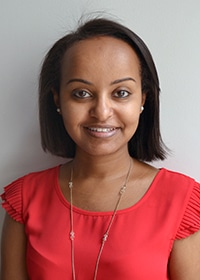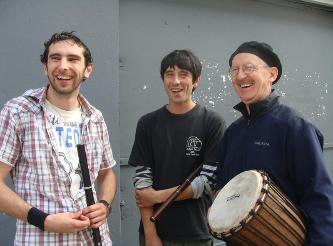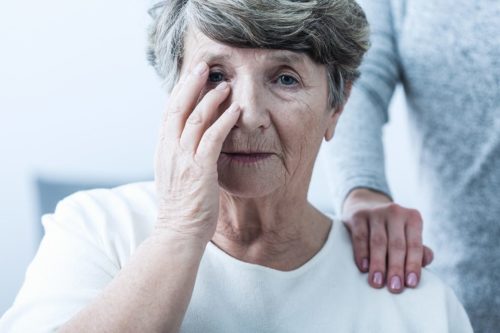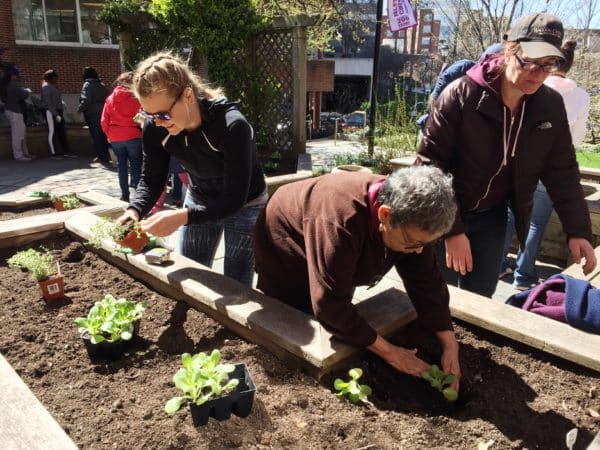Some familiar faces moved to a new beat at Friday’s Memory Café, featuring the rhythmic sounds of Deke Kincade.
Latest News
Updates on PMC Neuropsychology practicum students
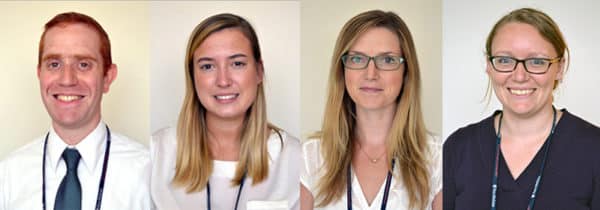
PMC Neuropsychology practicum students (from left): Shalom Shapiro, Psy.D., Kara Rudisill, MS, Emma Rhodes, MS, and Kayci Vickers, MS.
Shalom Shapiro, Psy.D., completed his pre-doctoral internship at the Penn Memory Center in June and received his doctoral degree from Widener University in Clinical Psychology.Throughout this past year, Dr. Shapiro performed neuropsychological assessments with clinical and research patients at PMC and co-facilitated groups in Cognitive Fitness Program. Shalom is interested in the relationship between personality and neuropsychological functioning, as well as in the integration of neuropsychological assessment and psychotherapy.
Kara Rudisill, MS completed her year-long practicum training at PMC in June. She also performed neuropsychological assessments with clinical and research patients under the supervision of Dr. Dawn Mechanic-Hamilton, Ph.D. Kara is a doctoral student in clinical psychology at Philadelphia College of Osteopathic Medicine (PCOM). Prior to PMC, Kara completed neuropsychological practicum placements at The Children’s Hospital of Philadelphia and the Center for Brief Therapy at PCOM. She will be moving on to expand her training in psychotherapy and pediatric neuropsychology next year.
Kayci Vickers, MS and Emma Rhodes, MA recently completed their year-long advanced neuropsychology practicum, which included conducting comprehensive neuropsychological exams and co-facilitating Cognitive Fitness groups.
Emma, a doctoral student in clinical psychology, specializing in neuropsychology at Temple University, will be remaining at PMC through the summer. Emma earned an MA in counseling psychology from Northwestern University. Her research interests include the influence of sociocultural and health factors on cognitive aging, as well as executive dysfunction in older adults.
Kayci will return in the fall to continue to support neuropsychological testing services in the PMC. She is a doctoral student at Drexel University studying clinical psychology, with a focus in neuropsychology. Her research has focused on consistency in decision making in adult populations and rehabilitation techniques to regain cognitive functioning after brain injury. Kayci earned her master’s degree in clinical psychology from Drexel University and her bachelor’s degree in behavioral neuroscience at the University of Kansas.
In addition to her clinical work, Kayci also prepared and submitted a manuscript using ADCC cohort data and Emma will begin data collection for her dissertation project in the coming months.In the future, she hopes to continue this line of research with the goal of improving rehabilitation outcomes and treatment recommendations for individuals experiencing cognitive decline.
Dr. Dawn Mechanic-Hamilton, Ph.D., on the accomplishments of PMC’s four neuropsychology students: “Shalom, Kara, Kayci and Emma were a hard-working, flexible and innovative team. We thank them for their dedication to the PMC and their compassionate care of our patients.”
Tigist Hailu, Director of Diversity in Research and Education at PMC, moves to CHOP
Please join us in saying farewell to Tigist Hailu, who has been the Director of Diversity in Research and Education at the Penn Memory Center since January 2013. Tigist will be starting this week as a Clinical Research Program Manager in the radiology department of the Children’s Hospital of Philadelphia (CHOP). In this position, Tigist will be managing the clinical research in the radiology department and supporting radiology training in Ethiopia.
House Appropriations Committee proposes significant increase in Alzheimer’s research funding for fiscal year 2018
By Chloe Elmer
The House Appropriations Committee released a proposed fiscal year 2018 Labor, Health and Human Services, and Education (LHHS) funding bill last week, giving Alzheimer’s research at the National Institutes of Health (NIH), a $400 million funding boost if signed into law.
This bill comes amidst the Alzheimer’s Association International Conference® 2017 (AAIC®) in London this week, where 5,000 of the world’s top Alzheimer’s and dementia researchers gather to network and discuss their research, findings, and theories in relation to Alzheimer’s disease, dementia, and other types of cognitive impairment.
Fall 2017 dates for PMC Caregiver Class announced
By Chloe Elmer
Being a primary or even a part-time caregiver can be challenging and overwhelming at times, not only for the actual care of a patient, but for the well-being of the caregiver as well. Caregivers of people with Alzheimer’s disease or other dementia may experience feelings of sadness, anger, confusion, hopelessness, or frustration.
The Penn Memory Center holds a seven-week Psycho-educational Caregiver Class to help caregivers develop skills to better help their loved one – and themselves – cope with the many changes of living with dementia.
There are two separate sessions offered through PMC, and new dates have just been announced for the fall.
July 28 Memory Café to feature drum circle with Deke Kincade
The Penn Memory Center is pleased to invite our patients and friends to a monthly pop-up café at Christ Church Neighborhood House in Old City on Friday, July 28, 2017. This program is exclusively for people with memory problems, including Alzheimer’s disease, and their partners/families/caregivers. This month’s featured artist is drummer Deke Kincade of Deke Kincade Rhythm, who will be facilitating a drum circle at the event.
PMC Clinician Olga Achildi talks “Coping When Dementia Turns to Delusion” in Philadelphia Inquirer article
By Chloe Elmer
Dementia doesn’t just cause memory loss; there are often other symptoms present. Stigma and denial of families and caregivers from the resulting symptoms, such as depression and delirium, can lead to a delayed-treatment time.
A recent Philadelphia Inquirer entitled “‘Mom, I Didn’t Steal Your Dentures’: Coping When Dementia Turns to Delusion,” by Stacey Burling, a medical writer for the Philadelphia Inquirer, says “70 percent to 90 percent of people with dementia have psychiatric symptoms at some point.”
Delusions and paranoia may turn to aggression or hallucinations. This article explores this issue as it relates to dementia, why it sometimes takes so long for families or caregivers to seek help for the patient, and why it’s important for the patient to be seen sooner.
Olga Achildi, MD, a clinician at the Penn Memory Center and geriatric psychiatrist and medical director for the inpatient psychiatry unit of Pennsylvania Hospital, says the delay isn’t due to just stigma, but the denial by family members that their loved one is affected.
“They don’t want to interpret somebody’s agitation as a psychiatric symptom of dementia,” Achildi told Burling, adding that families should seek help when they need it “because it’s a lot easier to manage these psychiatric symptoms earlier on without them getting out of control.”
But Achildi says in the meantime, for caregivers, remember the next time someone they are caring for with dementia says something outlandish that “it’s the disease talking,” and find ways to neutralize the situation.
Read the whole article on Philly.com.
Photo from IStock.com
New ARTZ Philly July events
ARTZ Philadelphia is a non-profit organization dedicated to connecting those living with dementia and their families and caregivers to interactive cultural experiences. Staff facilitate monthly group outings to museum partners to hold conversations about works of art at each museum.
Karlawish: Medicaid cuts will hurt nation’s caregivers, the daughters
Aging in America is, predominately, a problem for the nation’s daughters and daughters-in-law, and proposed cuts to Medicaid will hurt these caregivers and the people they care for, PMC Co-Director Jason Karlawish wrote in his latest Forbes column.
In gardening program, seniors plant seeds for teens’ cognitive health
By Janice M. Bonsu
Every Saturday for four months, I laced up my sneakers for a two-hour program called “Dance for Health: Active Body, Active Mind,” where older adults came together to engage in physical and intergenerational activity to promote brain health.
Usually, these Saturdays were spent learning line dances like the Bop and Charleston — dances that, as a 23-year-old, I was learning for the first time — in an effort to increase participants’ physical activity and, therefore, help preserve cognitive health. But the surprise beneficiaries turned out to be the high school students who participated in monthly intergenerational activities. These students showed up hoping to learn about cooking and gardening; they left with a roadmap for healthy aging.
- « Previous Page
- 1
- …
- 58
- 59
- 60
- 61
- 62
- …
- 91
- Next Page »
